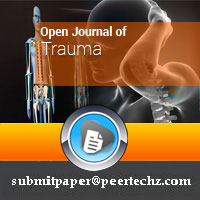Open Journal of Trauma
May a dissociative disorder contain sexual abuse of children through internet? A case report
John E Berg*
Cite this as
Berg JE (2021) May a dissociative disorder contain sexual abuse of children through internet? A case report. Open J Trauma 5(1): 004-005. DOI: 10.17352/ojt.000035Post-traumatic stress after abuse early in life, may be forgotten until late in life. Dissociative actions may be observed. An example of this is demonstrated in a case report from a resident psychiatric facility in Northern Norway. Under Norwegian Law, acts under dissociation is not regarded as being not fit for standing trial, but may be deemed a partial excuse. In the present case a sentence of 5 months was the result of court proceedings where dissociation was duly taken into account.
Introduction
Post-Traumatic Stress Disorder (PTSD) is a diagnosis emanated among military service men during war time. Initially called shell shock, the term later was later named PTSD or KZ syndrome (concentration camp disorder) [1,2]. The diseases are marked by psychological reactions to surviving death threats or imminent killings both as military service men and as inmates in concentration camps. Young people may be under similar stress containing sexual harassment or worse without a possibility of escaping, as in a family. The symptoms are somewhat different, for instance may there be a time interval without any remembrance of the acts. This is called enforced PTSD. Today there are no diagnostic numbers for this complex version of PTSD, neither in ICD-10 or DSM-5. Thus the numbers for ordinary PTSD must be used. The treatment is primarily psychological, takes a lot of time and must often take place in a resident setting. Nightmares and flashbacks may be reduced by neuroleptic treatment. The present case is purported to have such an complex PTSD.
Case report
A 68 year old man without any former contact with psychiatric care was referred to an outpatient resident facility because of isolation, anxiety and personal neglect. Two years before his referral he was summoned to the local police because of connections to a national pedophilic ring on the internet. Until that time he had lead an inconspicuous life with a family, a daughter and a job. After police interrogation he had a cerebral insult in the cell and was transferred to hospital for emergency treatment. He woke up partially incapacitated and could not speak. Several memories from childhood, which he told to his daughter. According to these memories that he suddenly became aware of, he was physically abused by his father. During resident treatment he vehemently rejected being sexually abused at home, but reluctantly confirmed what he had told his daughter. He maintained that from his childhood until after his cerebral insult, he had not thought about the abuse.
A forensic investigation by a psychiatrist and a psychologist was ordered by the court. The forensic experts followed the court trials. The experts maintained that he had no posttraumatic stress disorder, which is correct since he did not have a life-threatening experience earlier in life. He reported no flashbacks or nightmares and more generally was unaware of childhood violence. During his stay at the outpatient resident facility he told the author about a good me and a bad me, and that it must have been the bad me who was responsible for internet related sexual activity. The author interpreted this as possible dissociation. Complex posttraumatic stress disorder may be an alternative explanation. Then you often have no or faint memory of the violent acts you lived with and could not escape from, but you may experience some of the material through dissociation. And during dissociation you may perform seemingly organized activities.
Discussion
Whether dissociation may partly or at all explain sexual activities with children over the internet has not been studied. The author found no such studies in Pub Med searches. The court, as described above, did not find clear evidence that such connection might exist, but could neither dismiss it. The court experts probably did not differ between posttraumatic stress disorder proper with prior death threats and complex posttraumatic stress disorder with non-escapable violence and stress. Although connected to a pedophilic ring, the contribution of the case was small and infrequent.
The present case illustrates findings of Akyüz, et al. from 2007 [3]. They randomly selected 101 male prisoners and interviewed them with relevant scales for dissociation and PTSD. The probands reported high frequencies of criterion A trauma (85.2%) and lifetime PTSD (66.4%). Dissociative experiences were also more frequent than in the general population. Childhood trauma occurred at high rates among the prisoners.
Bourget, et al. found that claims of amnesia and dissociative experiences in association with a violent crime are not uncommon [4]. These may have relevance to the legal constructs of fitness to stand trial, criminal responsibility, and diminished capacity. From the standpoint of forensic psychiatry cases of offenders pretending dissociation during violent acts to explain behaviour would be frequent. Usually the experts do not investigate the possibility of the presence of complex posttraumatic stress disorder as the basis for later dissociation. Whether the acts in the present case are compatible with what may be done under dissociation is unsettled from scientific studies. More studies are needed.
- JonesE, Wessely S (2005) Shell shock to PTSD. Military psychiatry from 1900 to the Gulf war. Psychology Press, New York. Link: https://bit.ly/3zH8pO7
- Eitinger L (1985) Concentration camp survivors in Norway and Israel. Oslo Universitetsforlaget and Allen & Unwin.
- Akyüz G, Kugu N, Sar V, Dogan O (2007) Trauma and dissociation among prisoners. Nord J Psychiatry 61 :167-172. Link: https://bit.ly/3f3RjCc
- Bourget D, Gagné P, Wood SF (2017) Dissociation: Defining the concept in criminal forensic psychiatry. J Am Acad Psychiatry Law 45: 147-160. Link: https://bit.ly/3l8l2O7
Article Alerts
Subscribe to our articles alerts and stay tuned.
 This work is licensed under a Creative Commons Attribution 4.0 International License.
This work is licensed under a Creative Commons Attribution 4.0 International License.

 Save to Mendeley
Save to Mendeley
